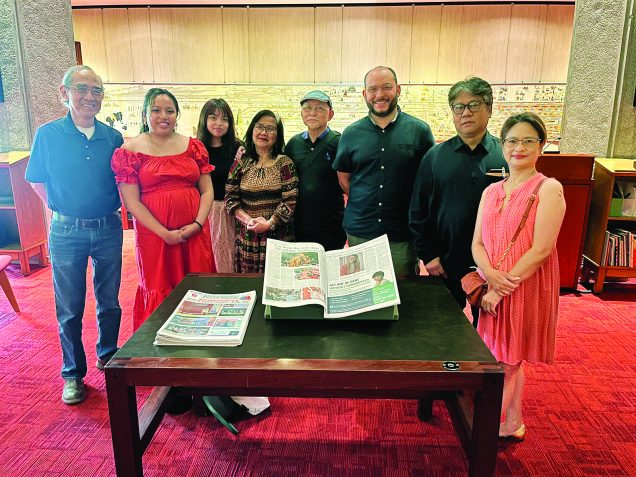Archival literature on the life and times of Filipinos in Canada
Archival literature on the life and times of Filipinos in Canada

TPR publishers and editors Hermie and Mila Garcia (center) turn over latest issues to TFRB Library’s David Fernandez (3rd from right). Writers from left: Rick Esguerra, Patricia Dolor, Sophia De Guzman, Lui Queano and Veronica Cusi.
The Philippine Reporter at the Thomas Fisher Rare Book Library

What Matters
By Mila Astorga-Garcia
The publisher and editors of The Philippine Reporter (TPR) turned over on August 10, 2023 the latest issues of the newspaper to the Thomas Fisher Rare Book Library, updating the latter’s archived collection covering 35 years of the newspaper’s continuous publication.
Receiving the copies was David Fernandez, head of the TFRB Library’s special collections. The Philippine Reporter up to now remains the only ethnic community newspaper in Canada with its print collection (except some missing issues) — from its first issue published in 1989 to the latest issue — archived and catalogued by the prestigious Library for public use.
Before the turnover, Fernandez presented an orientation tour of the impressively unique library, where we and our writers were joined by faculty, students, and visiting guests from other countries. The prestigious institution, housed in an impressive architectural structure on one wing of the Robarts Library, is currently celebrating its 50th year of service. The Library is part of the University of Toronto Libraries,
Fernandez said faculty and students, media and researchers from various institutions and the community have been accessing The Philippine Reporter collection for their own research purposes. We are both proud and humbled to be of service and to be in good company with the valuable literature that has been carefully selected and curated to be part of this great institution.
Holdings of the archives include ancient and modern literature. Among them are the original handwritten texts of Charles Darwin’s Origin of Species, some works of Shakespeare, the first book published in the Philippines (in Spanish), and other ancient literary gems. Modern literary works of celebrated authors such as Margaret Attwood are also kept there.
We were oblivious of the existence of the TFRB Library until 10 years ago, around The Philippine Reporter’s 25th anniversary, when Library staff contacted Hermie and me for an interview about TPR because a University of Toronto professor, Dr. Roland Sintos Coloma, had recommended the paper to be part of the archive’s collection.
The paper was being used by university students and faculty for their research, the Library was told. Vetting was done by senior officers and it was decided our paper would be a worthwhile acquisition for and a welcome addition to the TFRB Llibrary if we could donate a complete set of its print copies, and continue doing so as we published. We were just happy to do so, and that was how TPR became one of the treasured acquisitions of TFRB Library.
As librarians describe it, the collection reflects the life and times of Filipino-Canadians and the issues, struggles and triumphs of Filipinos who have taken varied pathways to immigration (live-in caregivers, migrant workers, family reunification, international students, etc.) in the Canadian diaspora.
Throughout the years, the paper has covered the history, immigration trends, issues, life and times of Filipino Canadians, and captured how they have adapted to the new country, bringing with them their heritage and culture, education, training and skills and their life stories to share with other Canadians.
Its writers have also written about the struggles of the most marginalized in the community such as the migrant workers trying hard to hurdle barriers to successful immigration so they can be reunited with family left back home. It has also covered important events in the Philippines that profoundly impact on the lives of Filipinos and Canadians alike. Beyond reportage, it has taken advocacy positions on human rights and social justice issues affecting the Filipino community.
Why the excitement about having print issues during a time when digital publishing is the norm these days? Although we regularly maintain our online edition, print still remains “king,” based on the feedback we get from our community of regular ureaders. Hence print copies, though limited in number, are now distributed and circulated by volunteers in urban and remote communities in at least six provinces in Canada where Filipino Canadians reside in big numbers. Besides, not everyone can have easy access to computers or even wifi for getting news and information they need, especially in remote communities.
We are told the paper is not only just being read for its news and views but also used as an educational and research reference, so some regular recipients file and keep the copies in community centres and their own households for that purpose. For us in The Philippine Reporter, this is what matters: that the newspaper is valued by our readers. This makes newspapering so fulfilling, even in these economically challenging times since the pandemic.
And why the excitement of print copies being archived for public use?
Fernandez, once explained to Filipino-Canadian students participating in a tour of The Thomas Fisher Library that the significant value of the archived collection of The Philippine Reporter is that their grandchildren and their grandchildren’s grandchildren can still have manual access decades and centuries from now to the original printed newspaper reporting on the life and times of Filipinos in Canada and the Philippines, much the same way as the tour participants had manual access to the centuries-old books presented during the Library orientation.
After our latest turnover of the latest copies of the paper, I posted a photo and a blurb about that visit to the Library on Facebook.
The post immediately resulted in positive comments, which we found very interesting and encouraging. We received numerous “Like” and “Love” responses from university professors, librarians, researchers, journalists, students and community members from Canada, the Philippines and Europe.
One retired Filipino-Canadian, Frank Villanueva, who travels between the Philippines and Canada, if not in Spain and other European countries, commented in the FB post:
“I have used The Philippine Reporter Collection when researching on Filipinos in Toronto 1970-2000. Thank You, PR and Fisher Library.”
Neni Sta.Romana Cruz, book author and former Chair of the Book Development Board of the Philippines, commented from the Philippines:
“Congratulations! More publishing years ahead!”
Fidela San Juan Blank, a high school classmate and former nursing research head of a health institution in the U.S. commented:
“Congratulations ! You make us proud! Long live, “The Philippine Reporter!”
Comments (0)